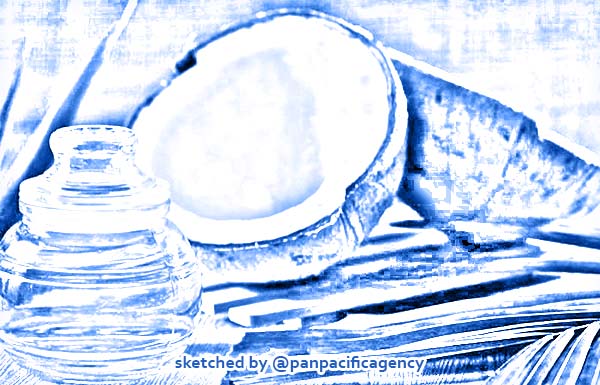Scientist studies coco oil vs novel coronavirus in Philippines

Use your coconut: Scientist Fabian Antonio Dayrit is proposing a study of coconut oil’s antiviral effect on the novel coronavirus. Photo: PhilStar. Sketched by the Pan Pacific Agency.
MANILA, Feb 5, 2020, PhilStar. A Filipino scientist has proposed studying the potential use of coconut oil as a possible treatment for the novel coronavirus (2019-nCoV), The Philippine Star reported.
Fabian Antonio Dayrit, professor emeritus at the Ateneo de Manila University, said lauric acid found in coconut oil – along with other derivatives – is used in a wide range of products for its antiviral properties.
“Several researchers have been designing drugs to specifically target protease enzymes in coronavirus, but testing for these drugs is many months away,” read the paper, which was co-written by Dayrit and physician Mary Newport from the Spring Hill Neonatology in the United States.
“What if there is a treatment candidate against the coronavirus that might already be available and whose safety is already established?” it read.
The paper, published last week on the Ateneo website, said three mechanisms have been proposed to explain the antiviral activity of lauric acid and its derivative, monolaurin.
It said various research have proven that they contribute to the disintegration of the virus envelope, inhibit late maturation stage of the virus and prevent the binding of viral proteins to the host cell membrane.
The authors proposed the conduct of a clinical study on patients with nCoV, noting that coconut oil and its derivatives have been shown to be safe and effective antiviral compounds in both humans and animals.
“Because of the antiviral and antibacterial protection that it provides to animals, coconut oil, as well as lauric acid and monolaurin, is used in farm animals and pets as veterinary feed supplements in chicken, swine and dogs,” they said, citing existing research on the topic.
“Monolaurin has been shown to effectively protect chicken against avian influenza virus,” it added.
Dayrit and Newport recommended a clinical study that would compare the effect of different derivatives of coconut oil to nCoV patients.
“Given the considerable scientific evidence for the antiviral activity of coconut oil, lauric acid and its derivatives and their general safety, and the absence of a cure for nCoV, we urge that clinical studies be conducted among patients who have been infected with nCoV,” read the paper.
“This treatment is affordable and virtually risk-free, and the potential benefits are enormous,” it added.
The World Health Organization (WHO) said there is no scientific evidence so far that would support claims for different nCoV cures.
Among those that it disputed were viral posts claiming that eating garlic or regularly rinsing the nose with saline solution would prevent nCoV infection.
The WHO also denied claims that putting sesame oil on the skin would prevent strains of the coronavirus from entering the body.
Scientists from different parts of the world are scrambling to find a viable cure, as well as a vaccine to prevent the spread of nCoV.
The University of the Philippines National Institutes of Health on Tuesday said it has developed a testing kit for nCoV.
Microbiologist and infectious disease specialist Raul Destura told a Senate hearing that they would have the testing kit evaluated by the Department of Health next week.